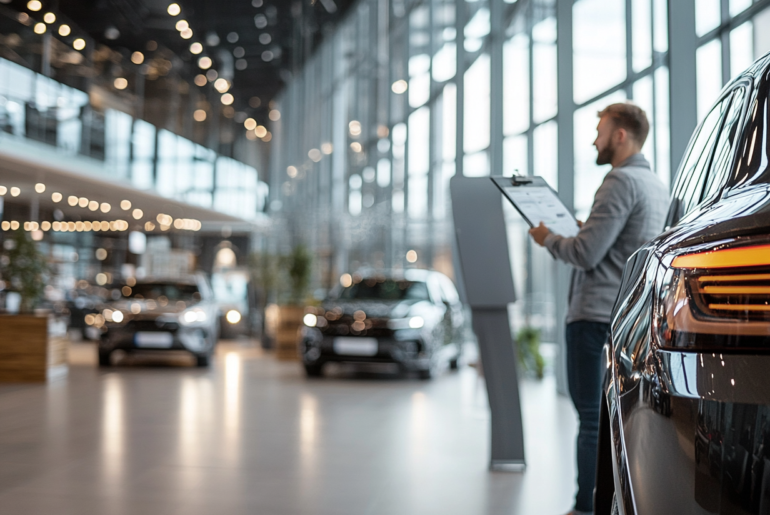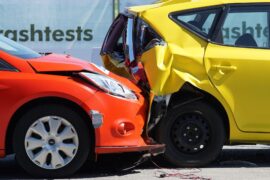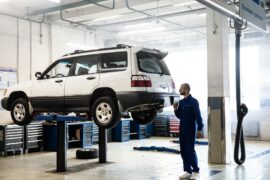This article may contain references to products or services from one or more of our advertisers or partners. We may receive compensation when you click on links to those products or services. Nonetheless, our opinions are our own.
The information presented in this article is accurate to the best of our knowledge at the time of publication. However, information is subject to change, and no guarantees are made about the continued accuracy or completeness of this content after its publication date.
When you buy a car, you have to make a big choice, which could have a big effect on your money and way of life. Should you buy a brand-new car right off the assembly line, or should you buy a used car that might be a better deal? Many individuals encounter this dilemma at some point in their lives. Knowing the pros and cons of each option can help you make a smart choice that fits your needs and budget. If you want the newest technology and a manufacturer’s warranty, or if you’re looking for value and dependability in a used car, keep reading to find out which path is best for you.
- Assessing Your Lifestyle and Budget
- The Appeal of New Cars: Exploring Modern Features and Warranties
- The Value of Used Cars: Unpacking Affordability and Depreciation
- Hidden Costs: What to Consider Beyond the Purchase Price
- Making the Decision: Tips for Weighing Your Options
- Final Thoughts: Empowering Your Choice for Financial Wellness
- Frequently Asked Questions
- Recommended Reads
Assessing Your Lifestyle and Budget
It’s important to think about your lifestyle and finances before choosing between a new and a used car. Think about things like how often you travel, how big your family is, and how much you need to commute every day. If you’re going to have more kids soon, for instance, you might need a bigger car, which could lead you to choose a new model with more safety and comfort features.
Your budget plays an equally important role. Consider the costs associated with both options:
- New Car: Higher depreciation rate, typically comes with a warranty, and often has the latest technology.
- Used Car: Lower purchase price but may require more maintenance or repairs and may lack the latest features.
A simple comparison table can help clarify potential costs:
| Aspect | New Car | Used Car |
|---|---|---|
| Average Price | Higher | Lower |
| Depreciation | Speedy (first 3 years) | Slower |
| Maintenance Costs | Often covered under warranty | Possibly higher |
| Insurance Rates | Higher | Lower |
By taking a close look at your needs and financial constraints, you’ll be better equipped to make a decision that aligns with your lifestyle and budget.
The Appeal of New Cars: Exploring Modern Features and Warranties
When you buy a new car, you enter a world of modern features that make driving more enjoyable. Think about how exciting it would be to drive a car with the newest technology, like adaptive cruise control, lane-keeping assist, and advanced infotainment systems. These new features make things more comfortable and convenient, and they also make things safer in ways that older models might not be able to.
Think about how nice it is to know that a new car’s warranty will cover you. Most new cars come with a long warranty period, usually between three and five years. This covers major repairs and includes roadside assistance. This means that you won’t have to pay for as many unexpected costs, and you’ll know that you’re protected from expensive repairs in the first few years of ownership.
Here’s a quick comparison:
| Feature | New Car | Used Car |
|---|---|---|
| Warranty | 3–5 years | Varies, often limited |
| Technology | Latest innovations | Older models may lack |
| Maintenance Cost | Low for initial years | Possibly high |
The Value of Used Cars: Unpacking Affordability and Depreciation
When buying a car, the price of used cars is often a key factor.Used cars usually cost a lot less than new ones, so you can get more for your money. In many cases, you can find a dependable car that fits your needs without going over your budget. Used cars usually have lower insurance rates, which can save you money over time.
Another important thing to think about is depreciation. New cars lose value quickly, sometimes by 20% to 30% in the first year. Used cars, on the other hand, have already lost most of their value, which means they keep their value better over time. This is helpful if you ever want to sell the car later.
Here’s a brief overview:
| Year | New Car Value | Used Car Value |
|---|---|---|
| Year 1 | $30,000 | $24,000 |
| Year 3 | $21,000 | $16,000 |
| Year 5 | $16,000 | $12,000 |
You can avoid a lot of initial depreciation by buying a used car, and you can also get a good resale value later. In a world where being smart with money is important, buying a used car can be a smart investment that fits your budget and will last.
Voted "Best Overall Budgeting App" by Forbes and WSJ
Monarch Money helps you budget, track spending, set goals, and plan your financial future—all in one app.
Get 50% OFF your first year with code MONARCHVIP
When considering a vehicle purchase, it’s easy to focus solely on the sticker price, but the reality is that the total cost of ownership extends far beyond that initial amount. Key factors to keep in mind include:
- Insurance Rates: New cars often come with higher insurance premiums due to their greater value. Used cars might save you money on your monthly policy.
- Depreciation: A new car loses value rapidly—often around 20% in the first year alone. Buying a used vehicle allows you to avoid much of this initial loss.
- Maintenance and Repairs: New cars typically come with a warranty, while older models may require more repairs. Maintenance costs can differ significantly based on the age and make of the vehicle.
Other important cost factors include registration fees, taxes, and financing costs, which can quickly add up.
| Cost Factor | New Car | Used Car |
|---|---|---|
| Insurance | Higher | Lower |
| Depreciation (1st Year) | ~20% | Minimal |
| Average Repairs (Annual) | Lower | Higher |
Knowing about these hidden costs can help you make a better choice that fits with your financial goals. Knowing about all the costs that come with owning a car will help you make a good budget.
Making the Decision: Tips for Weighing Your Options
Choosing between new and used can be tough. Think about the things that are most important to you before making a decision.
First, think about your budget. New cars are lovely, but they can be very expensive. You should also consider depreciation, which can reduce a car’s value by 20% as soon as you drive it off the lot. On the other hand, used cars might be a better deal because they let you get a higher-end model without spending too much.
Next, think about your driving needs and lifestyle. If you plan to keep the car for many years, a new car can offer reliability, the latest technology, and peace of mind through warranties. However, if you’re considering a short-term commitment, a used car might be more economical.
| Factor | New Car | Used Car |
|---|---|---|
| Cost | Higher initial price | Lower upfront cost |
| Depreciation | Rapid loss in value | Slower depreciation |
| Warranty | Full warranty coverage | Limited or no warranty |
| Features | Latest technology | Older features |
Ultimately, it’s about finding the right balance between your financial goals and your personal preferences. Gather the necessary information, compare options, and decide what fits your unique circumstances.
Final Thoughts: Empowering Your Choice for Financial Wellness
When deciding whether to invest in a new or used car, it’s essential to weigh the factors that matter most to you. Think about your financial situation and how each option aligns with your long-term goals. If a new car fits your budget and includes warranties and the latest technology, it might be worthwhile. However, buying a used car could save you significant money, leaving room for other financial priorities like savings or paying off debt.
Consider the following:
- Depreciation: New cars lose value quickly, while used cars have already endured most depreciation.
- Maintenance and Repairs: New cars often require fewer repairs and include warranties, while older cars have lower purchase prices.
- Insurance Costs: New cars typically cost more to insure.
- Financing Options: New cars may offer lower interest rates; used cars might require more upfront cash.
Choose what fits your lifestyle and financial picture. Aligning your purchase with your overall financial strategy helps you move toward sustained financial wellness.
Frequently Asked Questions
What are the benefits of buying a new car?
New cars come with a full warranty, providing peace of mind in case issues arise. They also include the latest technology, safety features, and fuel efficiency, enhancing your driving experience and potentially saving money long-term. You also have the option to customize features and colors to your preferences.
What are the downsides of purchasing a new car?
The biggest downside is immediate depreciation. The car’s value can drop significantly once driven off the lot. New cars also have a higher price tag, which may strain your budget. Insurance costs are typically higher as well.
What are the benefits of buying a used car?
Used cars usually come at a lower price, allowing you to get a better deal. They’ve already gone through the largest depreciation hit, so resale value is often better. There are also more options available if you’re looking for a particular model or year.
What are the downsides of purchasing a used car?
Used cars may have hidden issues or maintenance needs that weren’t disclosed. Warranties may be limited or nonexistent, leading to unexpected repair costs. Older vehicles may also lack the latest technology and safety features.
What should I consider about financing options?
New cars often come with attractive financing offers, such as low or zero-interest rates. Used cars may require a larger down payment and have higher interest rates. Evaluate your budget, credit score, and available financing options to determine the best fit.
How important is resale value in my decision?
Resale value is especially important if you plan to sell or trade in the vehicle in a few years. New cars depreciate quickly, while used cars may retain value better. Research specific models to assess resale potential and include that in your decision-making process.

Reviewed and edited by Albert Fang.
See a typo or want to suggest an edit/revision to the content? Use the contact us form to provide feedback.
At FangWallet, we value editorial integrity and open collaboration in curating quality content for readers to enjoy. Much appreciated for the assist.
Did you like our article and find it insightful? We encourage sharing the article link with family and friends to benefit as well - better yet, sharing on social media. Thank you for the support! 🍉
Article Title: Buy New Car for K or Used for K? Here’s How to Make the Smart Choice
https://fangwallet.com/2025/06/04/buy-new-car-or-used-car/The FangWallet Promise
FangWallet is an editorially independent resource - founded on breaking down challenging financial concepts for anyone to understand since 2014. While we adhere to editorial integrity, note that this post may contain references to products from our partners.
The FangWallet promise is always to have your best interest in mind and be transparent and honest about the financial picture.
Become an Insider

Subscribe to get a free daily budget planner printable to help get your money on track!
Make passive money the right way. No spam.
Editorial Disclaimer: The editorial content on this page is not provided by any of the companies mentioned. The opinions expressed here are the author's alone.
The content of this website is for informational purposes only and does not represent investment advice, or an offer or solicitation to buy or sell any security, investment, or product. Investors are encouraged to do their own due diligence, and, if necessary, consult professional advising before making any investment decisions. Investing involves a high degree of risk, and financial losses may occur including the potential loss of principal.
Source Citation References:
+ Inspo
There are no additional citations or references to note for this article at this time.












































